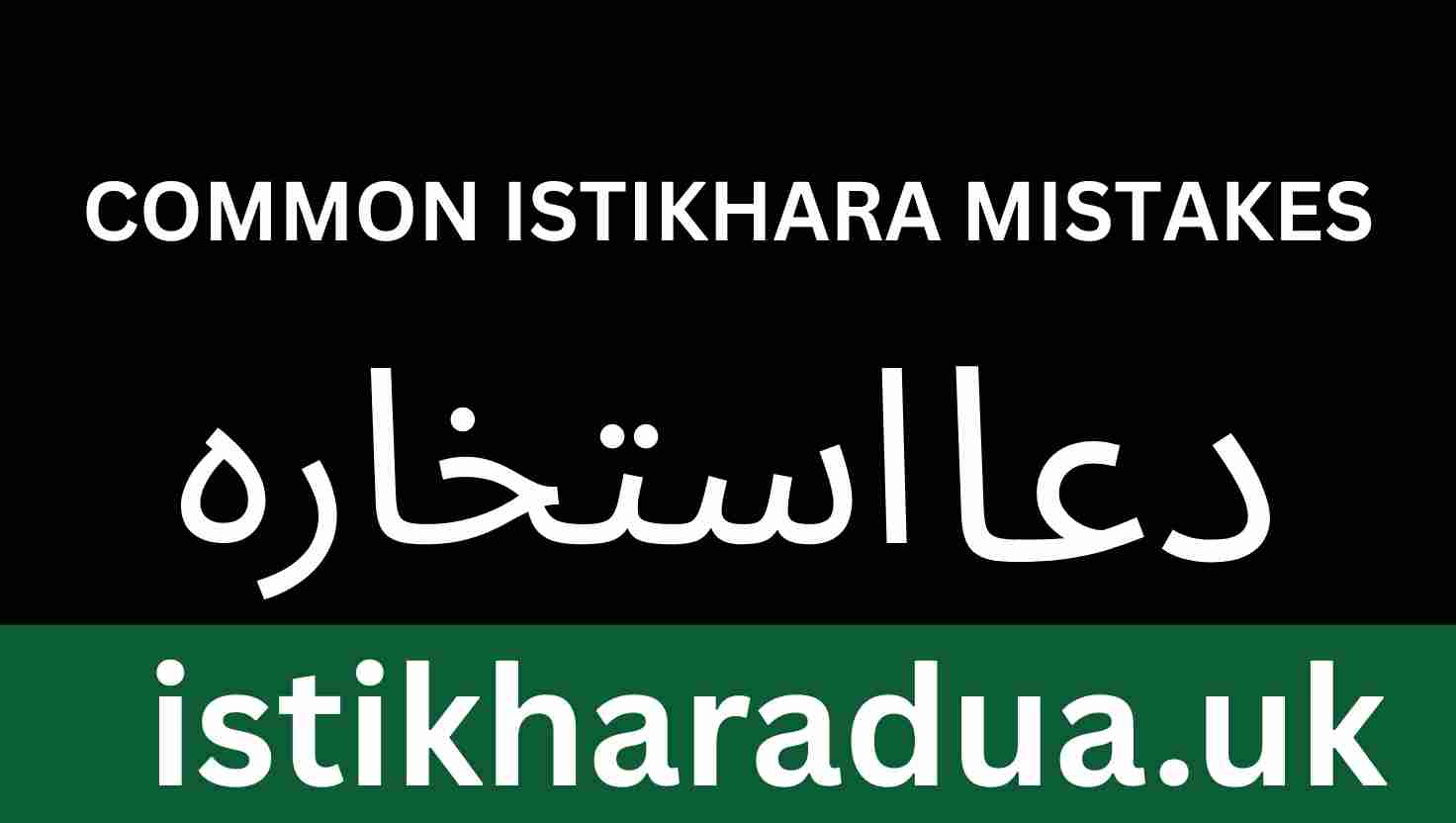 Common Mistakes People Make During Istikhara Dua
Common Mistakes People Make During Istikhara Dua
Common mistakes in Istikhara Dua include misunderstanding its purpose, expecting instant results, neglecting preparation, improper focus, and doubting the outcome. Correct these by learning its proper method and trusting Allah’s guidance.
Understanding Istikhara: The Prayer of Guidance
Istikhara, derived from the Arabic word “khayr” (goodness), is a powerful dua and prayer through which Muslims seek Allah’s guidance when making decisions. However, many believers make istikhara mistakes that can lead to confusion or dissatisfaction. This comprehensive guide explores these errors, offers practical tips, and busts myths to help you perform Istikhara correctly.
What Is Istikhara and Why Does It Matter?
Istikhara is a two-rak’ah prayer followed by a specific dua, as taught by Prophet Muhammad (peace be upon him), to seek divine guidance for decisions like marriage, career, or travel. It’s not about predicting the future but entrusting Allah to guide you toward what’s best. As Allah says in the Quran:
“And whoever relies upon Allah – then He is sufficient for him.” (Surah At-Talaq, 65:3)
Yet, errors in Istikhara often stem from misconceptions about its purpose or process, leading to anxiety or misinterpretation. Let’s dive into the most common mistakes and how to avoid them.
Common Mistakes in Performing Istikhara Dua
Mistake 1: Misunderstanding the Purpose of Istikhara
Many believe Istikhara guarantees a dream or clear sign pointing to “yes” or “no.” This is a major wrong way of Istikhara. The purpose of Istikhara is to seek Allah’s guidance, not to demand a specific outcome. The dua asks Allah to facilitate what’s good and avert harm, trusting His infinite wisdom.
Solution: Approach Istikhara with an open heart. Understand that Allah’s response may come through ease in your decision, clarity in your heart, or circumstances aligning naturally.
Hadith Reference: The Prophet (peace be upon him) said, “When one of you is concerned about a matter, let him perform two rak’ahs, then say the dua of Istikhara.” (Sahih al-Bukhari, 1166)
Mistake 2: Expecting Instant Results or Dreams
A common prayer mistake is expecting immediate clarity, such as a vivid dream. While dreams can sometimes guide, they’re not a requirement. Many people feel disappointed if they don’t see a sign, leading to doubt in the process.
Real-Life Example: Aisha, a 25-year-old student, performed Istikhara for a job opportunity but felt confused when no dream occurred. After consulting a scholar, she realized the job offer’s smooth process was Allah’s guidance.
Solution: Be patient and observe how events unfold. Allah’s guidance may manifest subtly through circumstances, feelings, or advice from others.
Mistake 3: Neglecting Proper Preparation
Errors in Istikhara often occur due to improper preparation, like praying without wudu, rushing through the dua, or performing it with a distracted mind. Istikhara requires sincerity and focus.
Beginner Tip: Ensure you’re in a state of wudu, pray two rak’ahs with devotion, and recite the dua slowly, understanding its meaning. Reflect on your intention before starting.
Scholarly Insight: Imam Nawawi emphasized that Istikhara should be performed with full trust in Allah’s plan, not as a ritual done hastily.
Mistake 4: Being Biased Toward a Specific Outcome
Some perform Istikhara while already fixated on a particular choice, such as marrying a specific person or accepting a job. This bias clouds their ability to accept Allah’s guidance, leading to avoiding errors in dua becoming harder.
Case Study (250 words): Ahmed, a 30-year-old engineer, performed Istikhara to decide between two job offers. He strongly preferred one due to its higher salary. Despite praying Istikhara, he ignored red flags like the company’s unethical practices, which surfaced later. After the job led to stress and regret, Ahmed consulted a local imam, who explained that his bias prevented him from seeing Allah’s guidance. The imam advised repeating Istikhara with neutrality, focusing on seeking what’s best in this life and the hereafter. Ahmed followed this advice, performed Istikhara again, and chose the second job, which offered better work-life balance and aligned with his values. This taught him to surrender his preferences to Allah’s wisdom.
Solution: Let go of preconceived notions. Make Istikhara with a neutral heart, asking Allah to guide you to what’s best, even if it differs from your desires.
Mistake 5: Doubting the Outcome
Doubting Allah’s guidance after Istikhara is a frequent istikhara mistake. Some repeat the prayer multiple times, hoping for a different result, which reflects a lack of tawakkul (trust in Allah).
Real-Life Example: Fatima performed Istikhara for a marriage proposal but felt uneasy afterward. She repeated it, thinking her discomfort was a sign of error. A scholar explained that her unease might be Allah’s way of steering her away. Trusting this, she declined the proposal and later found a better match.
Solution: Trust the outcome, whether it’s clarity, unease, or external signs. Allah’s guidance is always for your ultimate benefit.
Quranic Reference: “And it may be that you dislike a thing which is good for you and that you like a thing which is bad for you. Allah knows, but you do not know.” (Surah Al-Baqarah, 2:216)
Mistake 6: Not Consulting Others
Istikhara is not a substitute for due diligence. Failing to seek advice from knowledgeable people, like family or scholars, is a common wrong way of Istikhara. The Prophet (peace be upon him) encouraged consultation (shura) alongside Istikhara.
Beginner Tip: Combine Istikhara with practical steps, like researching your decision and consulting trusted individuals.
Hadith Reference: The Prophet (peace be upon him) said, “Seek advice from your brothers and then perform Istikhara.” (Sunan Ibn Majah, 1356)
Busting Common Myths About Istikhara
- Myth: Istikhara is only for major decisions like marriage. Truth: Istikhara can be performed for any decision, big or small, as long as it’s permissible. Scholars like Ibn Hajar encouraged its use for daily matters.
- Myth: You must see a dream for Istikhara to work. Truth: Dreams are not a requirement. Guidance may come through ease, obstacles, or intuition.
- Myth: Istikhara guarantees a perfect outcome. Truth: Istikhara aligns your decision with Allah’s will, but it doesn’t eliminate life’s challenges.
Beginner Tips for Performing Istikhara Correctly
- Learn the Dua: Memorize the Istikhara dua or keep it handy. Understand its meaning to pray with sincerity.
- Set a Clear Intention: Be specific about the decision you’re seeking guidance for.
- Pray with Focus: Perform the two rak’ahs with devotion, avoiding distractions.
- Be Patient: Trust Allah’s timing and avoid rushing for signs.
- Act on Guidance: Once you feel clarity or see signs, take action confidently.
Internal Link: Learn the full Istikhara Dua and its meaning for a step-by-step guide.
FAQs About Istikhara Mistakes
What are common mistakes in Istikhara?
Common mistakes include misunderstanding its purpose, expecting dreams, rushing the prayer, or being biased toward a specific outcome instead of trusting Allah.
Can I perform Istikhara without wudu?
No, wudu is required for the two rak’ahs of Istikhara, as it is performed like any other salah.
Should I expect a dream after Istikhara?
No, dreams are not necessary. Guidance can come through ease, obstacles, or inner feelings, not just dreams.
How many times can I repeat Istikhara?
Istikhara may be repeated up to seven times if clarity is lacking, but one should trust Allah’s guidance after each prayer.
Can Istikhara be done for small decisions?
Yes, Istikhara is for any permissible decision—major or minor—according to the Sunnah and scholarly consensus.
What if I feel uneasy after Istikhara?
Feeling uneasy may be Allah’s guidance to avoid that option. Reflect on it, seek clarity, and trust His wisdom.
Is consultation necessary with Istikhara?
Yes, combining consultation (shura) with Istikhara is Sunnah and ensures more balanced and informed decisions.
Author Bio
Maira Kamran is a passionate content writer dedicated to creating informative and engaging content that resonates with readers. With a focus on Islamic practices and lifestyle, Maira aims to provide valuable insights to help readers navigate their spiritual and everyday lives. Visit her whatsapp, for more helpful resources and guides.

 Common Mistakes People Make During Istikhara Dua
Common Mistakes People Make During Istikhara Dua